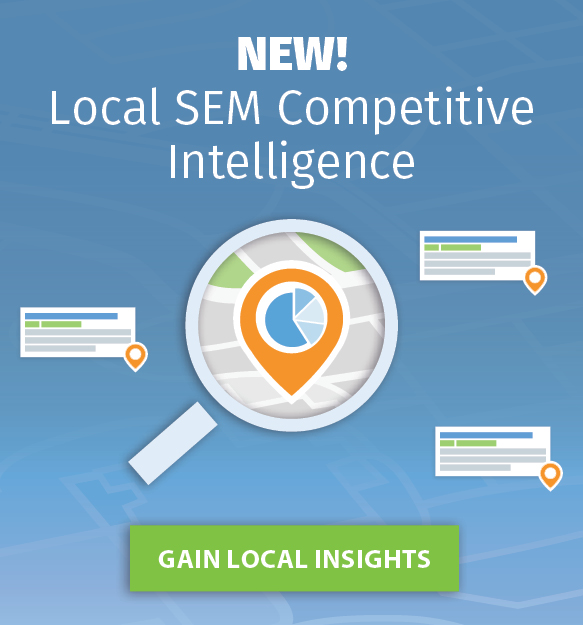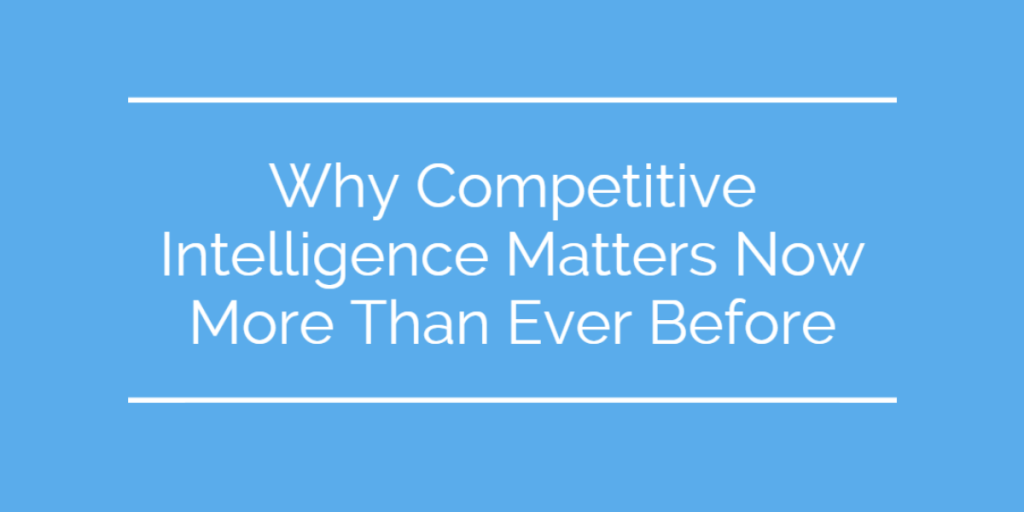
We’re going to start by telling you something that you already know. Then, we’re going to expand the concept to help you understand the importance of competitive intelligence in a way you’ve never thought about it before.
Are you ready?
Competitive intelligence matters more now than ever in the digital marketplace we all find ourselves in.
Do you know why?
It’s because your prospects are only a few clicks away from choosing a competitor.
Think about it this way…
Back in the day, your butcher shop would be on one side of town while your competitor was on the other side of town.
If someone is in your shop buying ground beef, they probably aren’t going to worry that much about a $0.05 or $0.10 per pound difference in price because they have to drive all the way to the other side of town to get it at a lower price. And that costs gas money which means they might as well buy it from the store that’s on their side of the town.
We’re not saying there wasn’t any competition, we’re just saying that competition wasn’t as fierce as it is today.
Now let’s fast forward a bit.
In today’s digital marketplace, your prospects are only one or two clicks away from choosing a competitor.
Let’s say you do marketing at MailChimp and have a prospect who Googles “Mailchimp email marketing” because they’re interested in signing up for your product. This is what they’ll see:

They’re going to see your ad, if you’re bidding on your own brand, but they’re also going to see three or four of your competitors’ ads.
And what if they decide to click on one of those ads? What if they decide to take a quick detour to learn more about one of your competitors? And even worse, what if they’re super impressed with your competitors’ landing page design and get sucked in by their sexy copy and list of impressive benefits? Then the kicker—they look at the pricing page and find out that your competitors’ service is cheaper.
What happens now?
You’re screwed, that’s what.
It’s not like every customer is going to take this path and choose a competitor, but prospects are almost always only one or two clicks away from choosing or at least viewing a competitor at any point in the buying process.
And brick and mortar stores are no longer exempt from this process.
Customers go into stores like Best Buy to check out a camera in person only to leave the store and buy the same camera for less from Amazon. It’s called “show-rooming,” and it happens all the time.
What we’re trying to tell you is that as awesome as the digital marketplace is at helping you reach more customers, which it is, it’s also a gauntlet you have to navigate your customers through in order to get them to order your product instead of a competitor’s.
The good news is that there are a lot of sales to go around; the bad news is that there’s always an increasing amount of competition for those sales.
So what should you do?
First, you need to level with yourself that digital marketing is highly, highly competitive. Whether you’re running an AdWords campaign or trying to rank for organic keywords, there’s 5, 10, 15, or even 20 companies that are competing for the same eyeballs that you are.
Actually, let’s take a look at some iSpionage competitor data to learn more about how much competition businesses face online.
CapitalOne is a leading credit card company who happens to spend between $478,144 to $1,326,117 per month on AdWords as seen in the screenshot below.
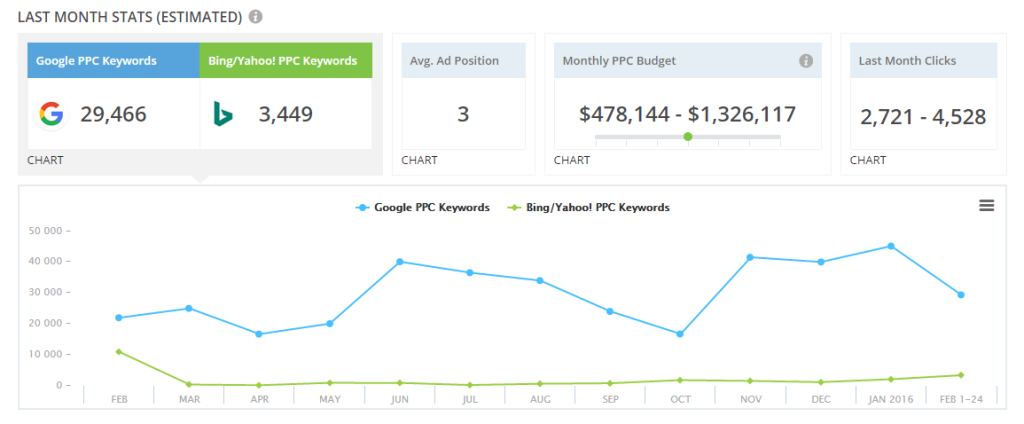
So how much competition does CapitalOne face on a daily basis?
iSpionage estimates that they have over 8,800 PPC competitors based on all of the different advertisers whose ads overlap with CapitalOne at one point or another.
Yet even if we narrow the list down to big PPC spenders that directly compete against CapitalOne, there are still at least 20 advertisers who make the cut as seen below.
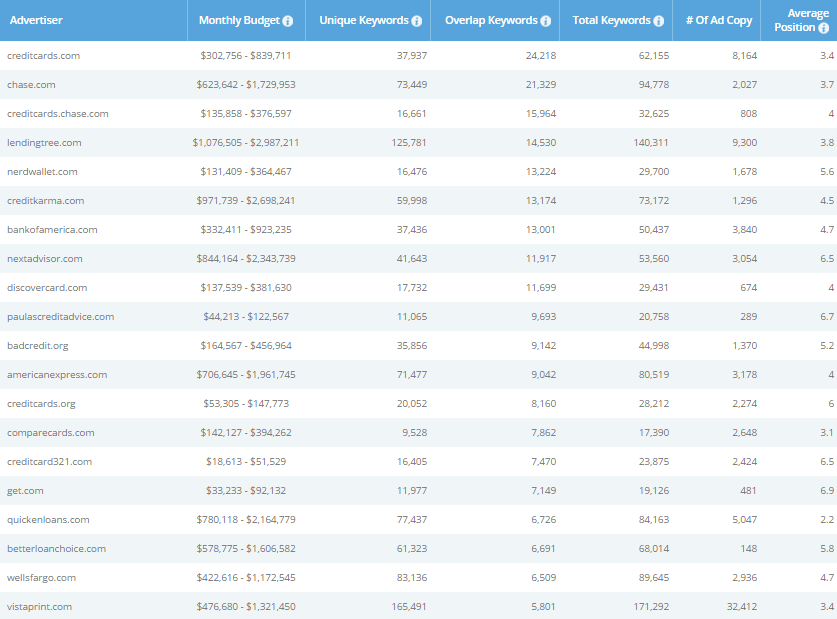
Guess what this means? It means CapitalOne has a lot of direct competitors…and so do you.
You see, even if you’re the only bank in a small town, you’re still competing with companies like QuickenLoans and LendingTree for loan clicks because the marketplace has changed. Nobody exists on an island or has a monopoly anymore, and it’s easier to compare companies side by side than ever before.
Let’s look at this from another perspective. If someone’s having trouble choosing a credit card, what will they do? They’ll Google “best credit cards,” of course, and when they do, this is what they’ll see:
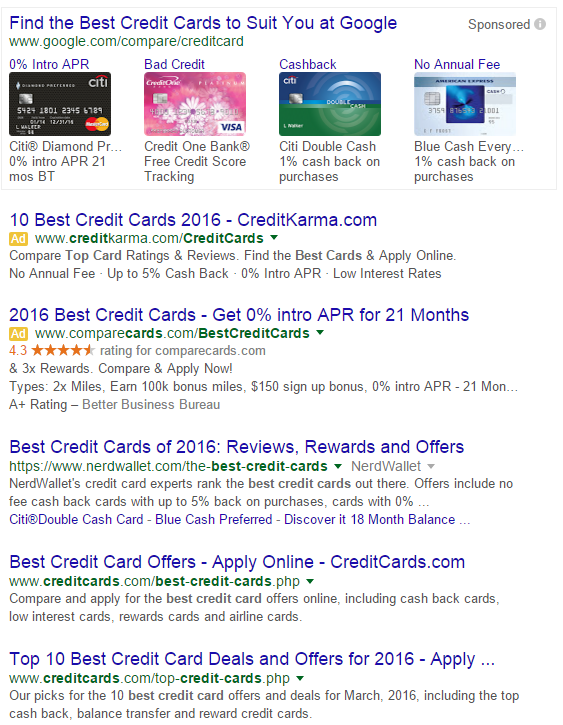
First, they see ads; then, they see articles listing what different websites recommend as the best credit cards. Let’s click on the first organic article to see which credit cards it recommends.
The first article is by NerdWallet.com. After clicking, we’re taken to the article which lists NerdWallet’s recommendations for the best credit cards for 2016. This includes the best cards for balance transfers, businesses, travel, rewards, etc., all based on which cards NerdWallet thinks are the best.
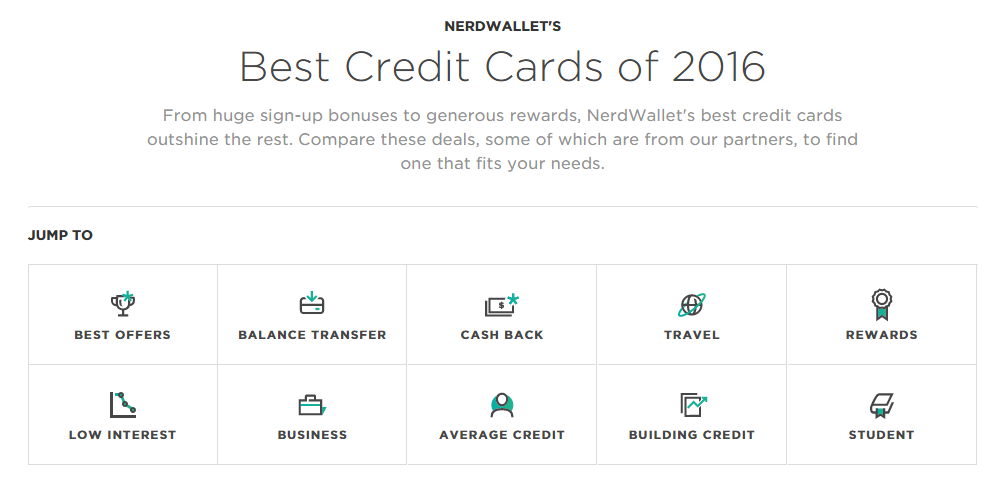
Source: https://www.nerdwallet.com/the-best-credit-cards
Guess what? Our hypothetical prospect is going to rely heavily on these types of recommendations for making a decision about which credit card to apply for. It also means your card is going to be compared side by side with competing cards, and that you’re at the mercy of whichever cards the recommending website decides to rank more highly.
The main point here is that even organic results are very, very competitive. Your prospects might see your billboard next to the freeway which makes them start thinking about applying for a new credit card (something you paid a pretty penny for, we’re sure), visit your site, and then decide to Google “best credit cards” at which point they decide to go to a competitor. This means that you paid for the billboard to get them interested in a new credit card, but your competitor reaps the benefit if they’re digital marketing game is stronger than yours.
This is exactly why competitive intelligence software matters more now than it ever has before. You need to know what your competition is up to so you can strengthen your digital marketing funnel and campaigns.
In part one of this competitive intelligence series, we explained that your business doesn’t exist in a vacuum which means you need to focus on building and growing your business but also means you can’t bury your head in the sand and ignore the competition.
This article takes a step forward to explain that not only can you not ignore your competitors, but if you do a lot of your marketing and business online (or if your customers make a lot of their purchase decisions online), then your customers are always only one or two clicks away from stumbling across a competitor who happens to be bidding on your brand name before choosing their product or service and not yours.
We should also mention that there are even advertisers who make this part of their ongoing strategy. In the example below, BigCommerce is not only bidding on the terms “shopify review” and “shopify competition,” but they’re also focusing their landing page on comparing their service against Shopify while attempting to convince people to use their service instead of opening a Shopify store.
Take a look for yourself (note—keyword, ad copy, and landing page data comes from iSpionage competitor data):

Digital marketing sure is ruthless, isn’t it?
It is, but the good news is that if you stick around and read the upcoming articles in this series on how to get a competitive advantage by converting market intelligence into actionable data, we’ll explain how you can use competitive intelligence to make smarter decisions at the strategic level while also getting quick wins at the tactical level.
Does that sound interesting? Then be sure to subscribe below for email updates so you don’t miss out on any of the articles from this in-depth guide on how to get actionable insights from competitive intelligence data.
